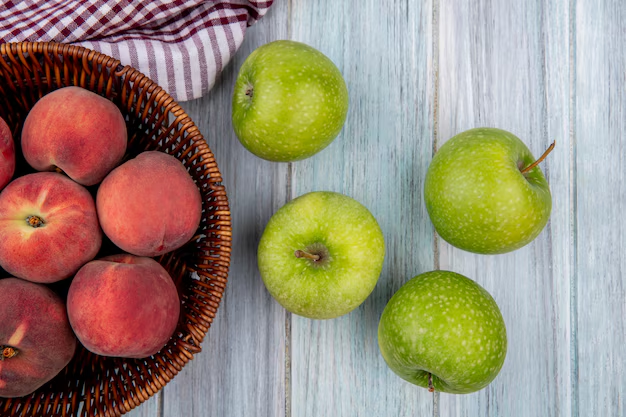Do Apples Really Stay Fresher in the Refrigerator?
Apples are a staple in many households, offering a deliciously crisp bite that's perfect for snacks, desserts, and even savory dishes. But how do you keep them fresh for as long as possible? You might wonder, do apples last longer in the refrigerator? Let’s explore the ins and outs of apple storage and discover the best ways to extend their shelf life.
🍏 Why Apple Storage Matters
Apples are not just popular for their taste; they're also celebrated for their nutritional benefits. Rich in fiber and vitamin C, they're a convenient source of healthy sustenance. Preserving their freshness is, therefore, important not just for flavor but also for maintaining their nutritional profile.
The Science of Apple Aging
Apples, like many fruits, continue to ripen after being picked. This ripening process is driven by a natural plant hormone called ethylene. Ethylene gas is responsible for several changes, from softening the fruit to altering its sugars, ultimately affecting its taste and texture.
By controlling the exposure to temperature and ethylene, the ripening process can be slowed, thereby extending the fruit's freshness. This is where proper storage techniques come into play.
🌡️ Temperature: A Key Factor in Apple Longevity
Refrigeration vs. Room Temperature
The debate over whether apples last longer in the refrigerator or at room temperature often comes down to personal preference and convenience. However, from a scientific standpoint, colder temperatures can significantly slow down the ripening process.
Storing apples in the refrigerator:
- Pros: The cold environment of a fridge (around 32-40°F or 0-4°C) reduces ethylene production and thus slows down the ripening. Apples can last several weeks to a month under optimal conditions.
- Cons: Temperature fluctuations in a frequently opened fridge can cause condensation, potentially leading to moisture accumulation and faster spoilage.
Keeping apples at room temperature:
- Pros: Apples are readily available for snacking. Their flavor can be more intense when warm, compared to freshly cold apples.
- Cons: Apples tend to ripen much faster at room temperature due to higher ethylene production, usually lasting just one to two weeks.
Tips for Refrigerating Apples
- Avoid dampness: Keep apples in a perforated plastic bag in the fridge to maintain crispness while allowing for air circulation.
- Separate from other produce: Apples emit ethylene, which can accelerate ripening of other fruits and veggies. Store apples in a dedicated fruit compartment if available.
- Regularly check for spoilage: Remove any spoiled apples to prevent rapid deterioration of the surrounding fruits.
🏡 Effective Methods for Extending Apple Shelf Life
1. Controlled Atmosphere Storage
Though not feasible at home, it's interesting to note that commercial apple production often utilizes controlled atmosphere storage. This involves storing apples in rooms where oxygen levels are minimized and carbon dioxide levels are elevated, substantially slowing the aging process.
2. The Role of Humidity
Apples benefit from a bit of humidity to maintain their texture. Ideally, store apples in a fridge crisper drawer, where humidity levels are higher compared to other compartments. Ensure that the packet or wrap provides some level of air circulation, as excess moisture can promote mold.
3. Packaging and Stacking Techniques
- Use breathable materials: Perforated plastic bags or mesh produce bags are excellent for reducing moisture build-up while keeping the cold air circulating.
- Stacking caution: Avoid piling apples too high; the weight can bruise the fruit at the bottom, accelerating spoilage.
🍎 Recognizing Freshness and Spoilage
Understanding the signs of freshness versus spoilage is key to maximizing apple storage.
Signs of Freshness:
- Firm texture
- Even coloration without excessive blemishing
- Sweet and crisp aroma
Signs of Spoilage:
- Soft or mushy spots
- Off-putting odor
- Browning or mold
Taking immediate action when noticing spoilage helps preserve the rest of the batch.
📌 Handy Tips for Apple Lovers
Here’s a quick reference to keep your apples fresher for longer:
| 🍏 Tip | 🌡️ Importance |
|---|---|
| 🥶 Refrigerate for Longevity | Slow down ripening and extend shelf life. |
| ⚡ Check Regularly | Quick action on spoilage can save the rest. |
| 📦 Use Proper Packaging | Avoid moisture while allowing airflow. |
| 🍽️ Separate Storage | Store separately from other fruits to prevent ripening. |
| 🌱 Eat Seasonally | Local and in-season apples often last longer. |
🍂 Apples Throughout the Seasons
Seasonal Variations
Understanding that not all apples are created equally can also aid in optimizing their storage. Different varieties have naturally different shelf lives. Firmer apples, like Granny Smith or Fuji, tend to store better and last longer than softer varieties like McIntosh.
Local Sourcing Benefits
Buy local when possible. Apples that haven't spent long periods in transit or storage prior to reaching the grocery store are likely fresher and have more storage potential once you bring them home.
🏆 Final Insights
To maximize your apple enjoyment, you want to look at both short-term needs and long-term storage strategies. Whether stored in the fridge for longevity or kept at room temperature for immediate use, understanding the conditions that extend freshness empowers you to make the best choices for your household. Remember, how you store your apples can make a world of difference not only in their taste and texture but also in their nutritional value.
🍏 Key Takeaway: For the longest shelf life, refrigerate your apples, ensuring proper packaging and regular checks for spoilage. Enjoy your apples for weeks to come by considering these storage strategies and tips.
Through thoughtful storage methods, you can savor every crisp, juicy bite of your apples without worrying about spoilage. Here's to keeping your apples fresh and your diet deliciously varied!

